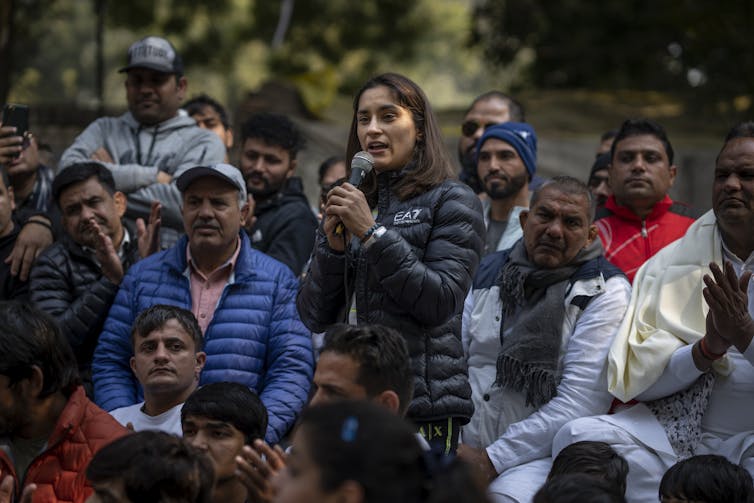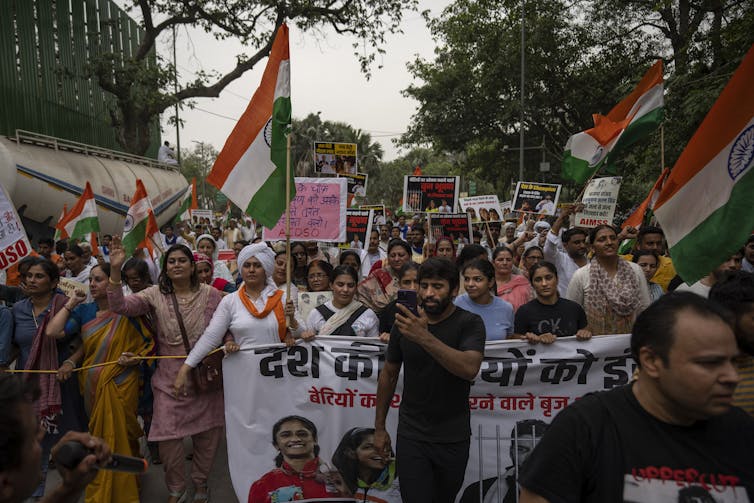For months now, Indian wrestling athletes, including Olympic medallists, have been leading protests in the capital of New Delhi. They are seeking the arrest of the Wrestling Federation of India’s president, Brij Bhushan Singh, who is facing allegations that he sexually harassed athletes.
Bhushan Singh has denied the accusations and has criticized child protection laws that he claims are being misused against him.
In response to their calls going unanswered, India’s Olympic wrestling champions recently threatened to toss their medals into the Ganges river.
Bhushan Singh is also a member of parliament from the ruling Bharatiya Janata Party (BJP). The wrestlers’ struggle for justice, dignity and a safe sporting environment has gained support from civil society groups, opposition parties and farmers’ unions.
However, far-right Hindu nationalists loyal to the government and its Hindutva ideology have attempted to bully and discredit the protesters.
Digital propaganda
A big part of that effort involves using digital propaganda like memes, disinformation campaigns and digitally altered content. These tactics have been used to target social movements in the past, such as the Bhima Koregaon protests and protest movements against proposed changes to citizenship and farming laws.
Similarly to the 2020-2021 farmers’ movement, the wrestlers’ protest is facing rampant demonization on social media. The wrestlers have even been accused of being linked to the Khalistanis, a banned Sikh separatist movement in India.
A digitally altered image of wrestlers Sangeeta and Vinesh Phogat recently appeared online showing them smiling inside a police van.
These kinds of altered images are designed to not only create confusion about the protests, but also downplay police violence.
During protests against the government’s proposed amendments to the citizenship law, apps were set up by Hindutva supporters to hold fake online auctions of Muslim women participating in protests.
Technology is being used to spread fake information and delegitimize protest movements. This means we need to reassess how online disinformation is challenged.
By the time these claims are debunked by fact-checkers, the harm caused by the spread of disinformation has already taken its toll on the protest movements. Studies have demonstrated how an individual’s pre-existing beliefs, knowledge and ideological orientation significantly impede their willingness to accept facts that contradict them.
Online counter-speech
Technology has become a key driving force behind social movements and protests. Think the Arab Spring and the Black Lives Matter movement. It has given protest movements a greater ability to expand, build coalitions and challenge the propaganda and disinformation of those in power with counter-speech.
Online counter-speech refers to how people counteract and respond to propaganda. It usually involves polite and non-aggressive responses, sharing fact-checked information and exposing the logical inconsistencies of messages shared online.
Political communication scholar Babak Bahador identifies counter-speech as a strategy of resistance that helps counter hate speech and propaganda without infringing on the right to free speech. Counter-speech confronts hate-speech, disinformation and propagandist viewpoints head-on to diminish their influence and popularity in online spaces.

But in India, where dissenting voices are increasingly marginalized and silenced, protests struggle to counter the government’s narratives. Social movements face online propaganda campaigns, use of political bots, monitoring through spyware like Pegasus and even internet shutdowns.
These tactics are designed to delegitimize dissenting voices, control the flow of information, deter popular mobilization, hide human rights abuses and unleash a collective punishment on any groups that challenge the authorities.
Read more: India farmers' protests: internet shutdown highlights Modi's record of stifling digital dissent
In India, well-organized digital propaganda campaigns have significant advantages over protest movements and voices from the margins. The wrestlers protest has benefited from the support of famous Olympians and their social media reach. But most protest movements do not have this marginal advantage in online spaces.
Challenging propaganda
To support counter-speech that can challenge the propaganda of governments, experts and academics need to rethink how efforts like digital media literacy programs and fact-checking can effectively respond.

The challenge is significant, particularly when Narendra Modi’s government is increasingly trying to control online spaces. A proposed amendment to the country’s internet rules would give the government more power to police online content. The amendment would allow the creation of a fact-checking body that would have the power to order websites to take down content the government deems false.
This poses severe risks to critics and journalists. It would essentially allow the government to penalize any dissent and target any opposition.
On the one hand, we need to demand accountability from online and social media platforms regarding the content posted and transparency on their algorithmic operations. On the other hand, we need platforms to maintain their autonomy and not yield to government pressure for censorship.
Profit-oriented digital platforms alone cannot address these issues. In order to combat propaganda and disinformation, it is crucial to support democratically owned businesses like platform co-operatives, independent journalism and develop public service media and internet platforms that value truth and transparency and treat people like citizens, not consumers.
Ashique Ali Thuppilikkat does not work for, consult, own shares in or receive funding from any company or organization that would benefit from this article, and has disclosed no relevant affiliations beyond their academic appointment.
This article was originally published on The Conversation. Read the original article.







